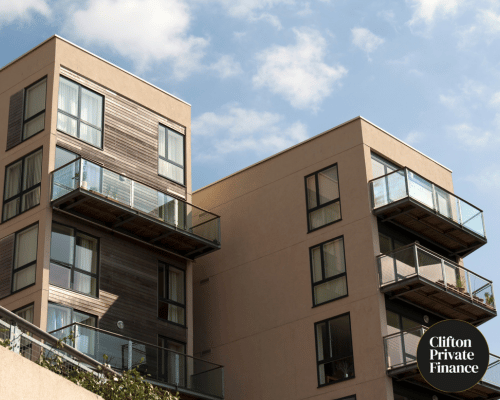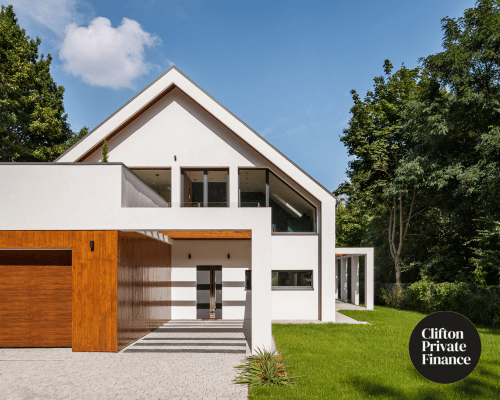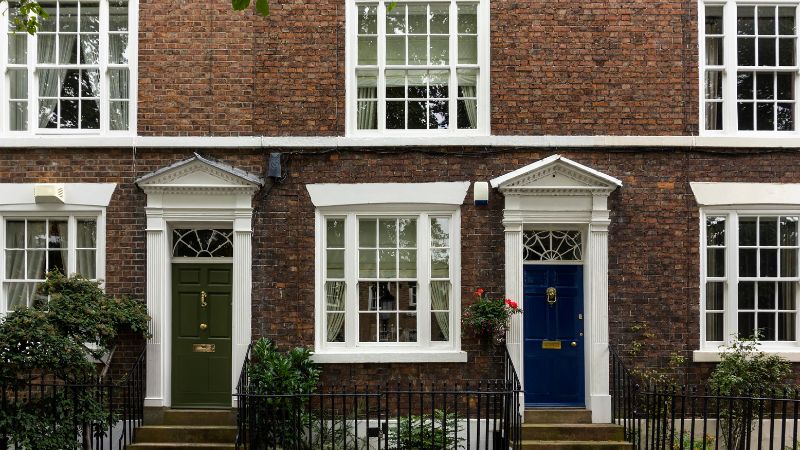What is Property Development Finance?
Property development finance is a short-term loan specifically designed to fund property construction, conversion, or heavy refurbishment plans. It helps property developers to proceed with profitable projects when they do not have large volumes of cash on hand.
You can use development finance if you’re looking to:
- Build from the ground up
- Convert a space
- Refurbish an existing property
Unlike traditional loans, property development finance caters to the complexities of construction and renovation projects, with funds typically released in stages that align with progress.
An initial amount is typically used to purchase the site or refinance existing debt. Following this, the lender monitors your progress, and the remaining funds are drawn down to cover costs as needed.
You pay interest on what you use, giving you the flexibility to borrow efficiently according to the demands of your project. The interest is typically paid in full at project completion, to help with cash flow during the project.
After completing your project, you repay the property development loan through the sale of your property or by refinancing it to a standard mortgage product. Depending on what you’re using the property for, this could be:
- Residential mortgage: for when you plan to live in the property
- Buy-to-let mortgage: for when you plan to let the property
- Commercial mortgage: for when you plan to use the property for business
How Property Development Finance Works
Property development finance typically works as a staged release of funds:
- There is an initial release, generally used to purchase the required land or the property for renovation, for example
- The rest of the funds are disbursed in stages to cover construction costs
- Lenders carefully monitor your progress against the information provided during the application process, ensuring your project stays on track
This system is in place to act as a safety net for developers and lenders, mitigating risks and maintaining the project's momentum.
The staged funding process means your loan is allocated effectively, and you’re not paying interest on chunks of your loan that you can’t actually spend yet.
What Does GDV Mean in Property Development?
GDV stands for Gross Development Value. It is the projected market value of all properties in a development once all works are completed. You can also think of it as the total revenue the developer expects to receive after all properties have been sold or let.
The GDV of a development is one of the most important factors for lenders. The amount you can borrow depends on the GDV of your development project, and if the total costs are too high when compared to the GDV, your application for property development finance may not be approved.
4 Types of Property Development Finance
Property development is an exciting and diverse landscape. Every project comes with its unique set of requirements, and it’s why we love working in the industry.
There are four main types of property development finance that cater to different development scenarios, and most development projects will fall into one of these four categories.
1. Property Development Exit Finance
Development exit finance is a type of bridging loan for property developers who have already completed most, if not all, of their project milestones. It’s a helpful way to save costs and maximise your potential profit opportunity.
Property development exit finance allows you to:
- Fund the final stages of your development project
- Repay an existing loan and save money on interest while the property sells
- Raise additional funds to market the property
- Access short-term relief to avoid rushing a sale below value
- Invest in your next development project
Interest rates on development exit loans are typically lower than the finance taken out at the beginning of a project. This is because most, or all, of the development work is complete, lowering the amount of risk to the lender.
2. Light Refurbishment Loan
A light refurbishment loan can work well for relatively unobtrusive work to the property. There's no strict definition of a light refurbishment project, but usually, it’s one where:
- Planning permission is not required
- There is no change to the nature of the property
- Building regulations do not apply
Examples of light refurbishment projects include upgrading bathrooms, fitting new kitchens, and replacing floor coverings.
Light refurbishment loans usually have slightly lower interest rates tailored for smaller development projects.
If you can keep the timescale of the renovations tight, light refurbishment finance will work well for you.
3. Heavy Refurbishment Loan
A heavy refurbishment loan is for when your project involves significant structural changes, including building on an extension and altering internal supporting walls.
This type of loan is best suited for projects where:
- The light refurbishment criteria do not apply
- Structural refurbishment is required
- The development costs more than 15% of the value of the property or land
These are offered as finance for larger development projects, where the lender’s risk and administrative involvement are greater – consequently, their interest rates are higher.
With extended project time and possible delays for planning approvals, you will likely need heavy refurbishment finance to run longer than the standard maximum of 12 months. Most lenders can offer up to 18 months, and some will lend for up to 36 months.
4. Ground Up Development Loan
A ground up development loan is for major new-build projects involving complete building plans. These projects must be approved and requires a team of architects, builders, and tradespeople to work together.
This type of project requires more complex ground-up development finance, with a greater series of investment releases.
The best finance rates for ground up development funding are commonly reserved for experienced property developers. To access the most favourable deals, lenders typically want to see a proven track record and a portfolio of successful projects.
Can Property Development Finance Cover 100% of the Costs?
Yes, it is possible to get property development finance that covers 100% of the land purchase and development costs for a project.
However, lenders will want you to put in at least 30% of the acquisition cost.
In addition, the total funding you receive should not exceed 65% of the project’s GDV.
Additional mezzanine finance can be sourced up to 90% of GDV for suitable projects.
Several lenders in the development finance market are prepared to provide 100% of the funding needed to purchase land or property, plus the development costs. But the borrower must qualify, and prove affordability, for this level of development finance.
Pros and Cons of Property Development Finance
Property development finance comes with its own distinct advantages and disadvantages. It’s important to understand these when making any kind of decision about whether to apply for funding on your project.
We always recommend speaking to an independent expert about your project and circumstances.
They will be able to talk you through how these advantages and disadvantages apply to your specific situation.
3 Pros of Property Development Finance
- Development finance caters to various project types and scales, from shorter-term bridging loans to longer-term, large-scale development loans
- Staged release of funds is key to managing cash flow effectively while ensuring the project stays on track
- With options for newcomers, development finance opens doors to the exciting world of property development for anyone
3 Cons of Property Development Finance
- Compared to traditional loans, development finance can have higher interest rates due to the increased risk taken by the lenders
- Lenders often require detailed project plans, financial projections, and a proven track record, making the application process more demanding
- In addition to interest on the amount you borrow, development finance comes with various fees, which add to the overall cost
Property Development Finance Costs and Fees
Property development finance involves a range of costs and fees that you should be aware of.
Here's a breakdown of the primary expenses you will typically come across, however it’s important to speak to an expert to understand how these fees may apply to your specific application.
Certain fees may be higher, lower, or even waived completely depending on the type of development finance you secure, and the broker and lender you work with.
- Interest: The largest cost usually lies in the interest charged by lenders, with rates dependent on the amount of finance you require, and the risk and complexity of your project
- Arrangement Fee: Lenders charge this fee, typically 1-3% of the loan amount, for arranging the facility. It is often added to the loan and repaid at the end of the term
- Valuation Fees: A RICS surveyor conducts a survey and evaluates the site, charging a fee for their services. This fee is usually paid early in the application process and may not be refundable if issues arise
- Quantity Surveyor Fees: Lenders appoint a quantity surveyor or monitoring surveyor to track the build progress. Their fees cover the assessment of development costs and the work schedule
- Legal Fees: Charged by your solicitor to manage the legal aspects of completing the loan, these fees often include the lender's legal fees
- Drawdown Fees: Fees may be payable each time a drawdown is taken, including telegraphic transfer fees charged when funds are released
- Exit Fees: Often charged as a percentage of the loan amount or Gross Development Value, exit fees are paid to your lender at the end of the loan term when refinancing or selling the completed development
- Broker Fees: Brokers typically charge a fee for their services of arranging your development loan, up to 2% of the loan amount
How to Apply for Property Development Finance
You can apply for property development finance directly with a lender or speak to a specialist property development finance broker. A specialist broker will compare options across the full market, before connecting you with the right lender for your project.
Whether that's a small home renovation project or a fully-fledged ground-up development, a good broker will find the right lender and the best terms for you.
At Clifton Private Finance, we independently compare the full UK lending market to help you:
- Get a better interest rate
- Negotiate more flexible terms
- Secure a larger development loan
- Navigate the process from start to finish
Call us on 0203 900 4322 to discuss your requirements, or book a free consultation below.









.jpg)


